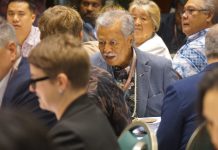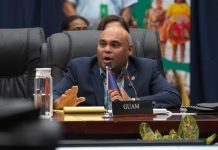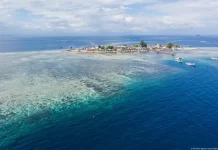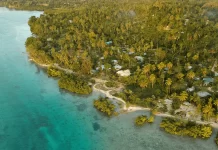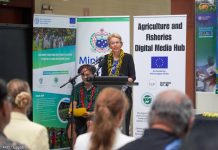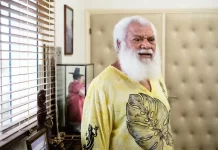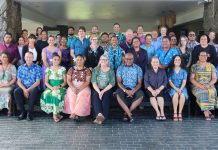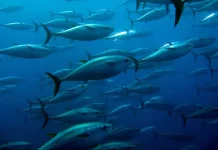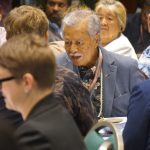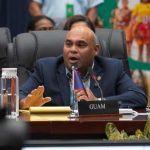Today at INC4 over two dozen countries have signed on to the Bridge to Busan Declaration.
Launched at the Plastics Treaty negotiations, it invigorates the call for sustainable production levels of primary plastic polymers. Now open for countries and stakeholders to sign up, the Bridge to Busan Declaration amplifies their concern about the many harms of plastic pollution to human health and the environment.
Signatories are clear in their commitment to end plastic pollution worldwide.
“Addressing primary polymer production is squarely within our mandate and essential to achieving our goal. You can’t sweep the elephant in the room under the carpet,” said Mr Dennis Clare, negotiator for the Federated States of Micronesia. FSM played a leadership role in developing the Declaration with other members.
The United Nations Environment Assembly Resolution 5/14 directed a legally binding instrument based on a comprehensive approach that addresses the full lifecycle of plastics. This is to be developed through five sessions of the Intergovernmental Negotiating Committee, the first was held in 2022, with the fourth session now underway in Ottawa. The fifth and final session is set to be scheduled in Busan, South Korea in November this year.
For the signatories of the Bridge to Busan Declaration, the focus is sharp. This legally binding instrument must ensure there is commitment this includes the production of primary plastic polymers.
“While we celebrated the UNEA Resolution to develop an international legally binding instrument on plastic pollution including in the marine environment, we are struggling to see this promise for a safer planet translate into text at these negotiations,” said Ms Marjorie Wells, the Pacific Small Islands Developing States Chair coordinating the Pacific SIDS Members negotiating at the INC4.
“On the final day of these negotiations, we hold on to hope that all member states will demonstrate global leadership. We must address primary plastic polymers in the treaty. The world created history with the Paris Agreement, we need to show humanity that we can do it again.”
The Declaration reads:
Studies show that the world cannot achieve its goals of ending plastic pollution and limiting global average temperature rise to less than 1.5° Celsius if the unsustainable production of primary plastic polymers is not addressed.
Left unaddressed, production of primary plastic polymers is projected to increase exponentially through 2050 and could overwhelm national waste management and recycling programs, even after significant improvements supported by the new instrument.
Addressing the unsustainable production of primary plastic polymers is not only essential to ending plastic pollution worldwide; it also represents one of the most efficient and cost-effective approaches to managing the plastic pollution problem.
“The science is irrefutable – plastic harms us, it is everywhere. We now breathe, eat and drink plastics which accumulate in our bodies. If we don’t address the flood of primary plastic polymers, we will have more plastic than fish in our waters by 2050,” said Mr Halatoa Fua, Head of the Cook Islands delegation at INC4.
“What legacy are we leaving all humanity? We know the dangers; we are given the gift of helping all humankind through this new plastics treaty. We must do the right thing and address these core elements.”
The Bridge to Busan Declaration is open to countries and stakeholders to sign, declaring they:
COMMIT to achieve sustainable levels of production of primary plastic polymers. This includes ensuring production matches ambitions for a circular economy for plastics, while aligning with the Paris Agreement goal of limiting warming to 1.5°C.
ENSURE transparency in the production of primary plastic polymers. This includes reporting of data on the production of primary plastic polymers to close information gaps, assess progress and inform priorities.
AGREE to a global objective regarding the sustainable production of primary plastic polymers. This may include production freezes at specified levels, production reductions against agreed baselines, or other agreed constraints to prevent the unsustainable production of primary plastic polymers.
From the Pacific Islands the current signatories are the Cook Islands, Federated States of Micronesia, Fiji and Vanuatu. Fiji will also be a new signatory.
To sign on to the Bridge to Busan please visit: https://www.bridgetobusan.com/
The fourth Intergovernmental Negotiating Committee to develop an international legally binding instrument on plastic pollution, including in the marine environment is taking place in Ottawa, Canada, from 23-29 April 2024.
The Pacific Islands are represented by the Cook Islands, Federated States of Micronesia, Fiji, Kiribati, Marshall Islands, Nauru, Niue, Palau, Papua New Guinea, Samoa, Solomon Islands, Tonga, Tuvalu and Vanuatu through the support of the Government of Australia and the United Nations.
They are supported by the Secretariat of the Pacific Regional Environment Programme (SPREP), working with partners the Pacific Islands Forum Secretariat (PIFS), Office of the Pacific Ocean Commissioner (OPOC), The Pacific Community (SPC), Forum Fisheries Agency (FFA), Environmental Investigation Agency (EIA), Centre for International Environmental Law (CIEL), University of Wollongong, WWF and Massey University.
For more information visit: https://www.unep.org/inc-plastic-pollution/session-4


